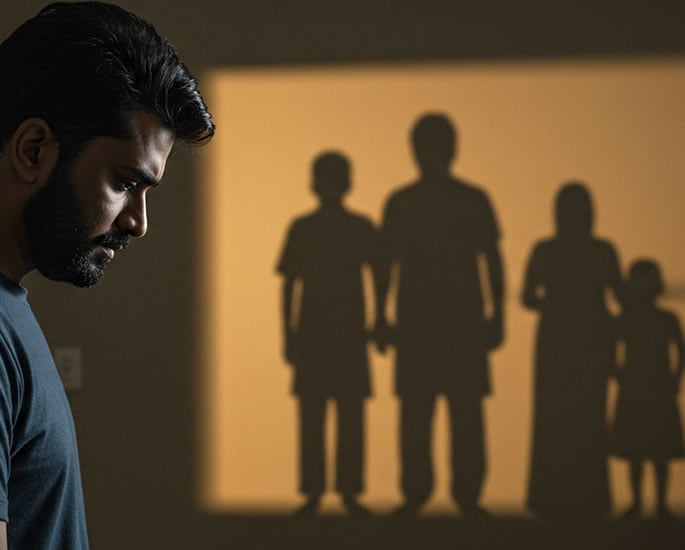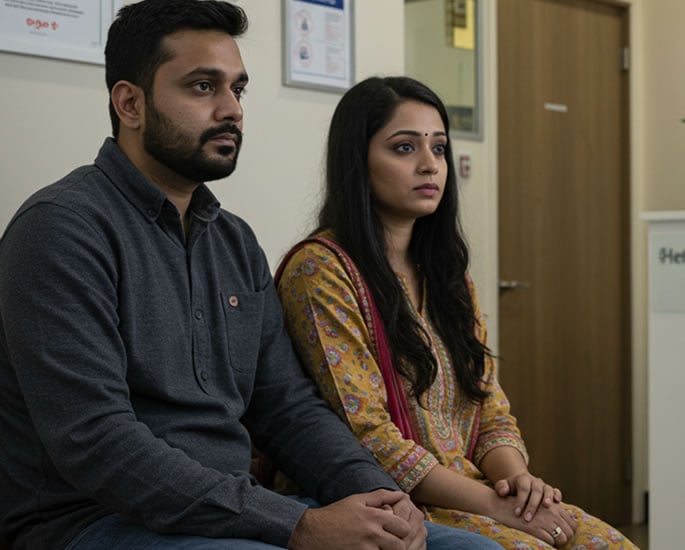"You can feel them quietly judging you."
For many British South Asian men, the diagnosis of male infertility can be a silent burden, a source of profound shame and unspoken grief.
In a culture where family and fatherhood are deeply intertwined with a man’s identity and standing, the inability to conceive can feel like a direct challenge to one’s masculinity.
This deeply ingrained stigma often prevents men from seeking the help and support they so desperately need, forcing them into a lonely and isolating struggle.
It also impacts women because the struggle to conceive leads to a disproportionate focus, and blame, on them.
We explore the silence surrounding this issue, the impact it has and the need for open conversation and support.
Cultural Pressure & Masculinity

In many South Asian cultures, the pressure to have children is relentless. Children are seen as essential for a complete and fulfilling life, and childlessness is viewed as a social failure.
This pressure is also reinforced by the community at every turn, from casual questions at family gatherings to more direct and intrusive inquiries.
This intense focus on procreation is deeply rooted in the patriarchal structure of many South Asian societies. The ability to produce an heir is seen as a way of securing the family lineage and maintaining social standing.
For men, in particular, fatherhood is often viewed as a key marker of manhood and success.
The colonial legacy has also played a role in shaping these attitudes.
The British, during their rule in India, often reinforced existing patriarchal structures and introduced their own Victorian notions of masculinity and family.
These ideas have been passed down through generations, creating a complex and often contradictory set of expectations for modern British South Asian men.
For those who are unable to meet these expectations, the emotional toll can be immense.
Haroon* told DESIblitz: “At every family gathering, it’s always, ‘Any good news yet?’
“They look at you, then they look at your wife.
“You can feel them quietly judging you.
“You just smile and say, ‘Soon’. But inside, you’re crumbling.”
The fear of disappointing their families, of being seen as a failure, can be overwhelming. This fear is often what drives the silence, preventing men from opening up about their struggles and seeking the support they need.
The fear of being labelled “defective” is a common theme among those who have struggled with infertility
Seetal Savla, writing for the Human Fertilisation and Embryology Authority, noted:
“Fear of being shunned as our misfortune might be contagious.”
This fear, she explains, can lead to social isolation and a profound sense of shame.
Blame on Women

Male infertility contributes to 50% of all conception-related difficulties. But in Desi communities, the blame tends to be directed towards women.
This deep-seated bias is reflected in the language used to talk about infertility.
It is often referred to as a “woman’s problem”, and women are the ones who are expected to undergo endless tests and treatments, even when the issue may lie with their partner.
This can create a huge amount of stress and resentment within a relationship, and can further isolate men who are struggling with their own feelings of guilt and inadequacy.
Priya*, whose husband struggled with low sperm count, recalled:
“I knew it wasn’t my ‘fault’, but after years of hearing the whispers, you start to doubt yourself.”
“The worst part wasn’t the gossip; it was seeing the guilt eat away at my husband. I wanted to protect him, so I took the blame. It made me angry, but I love him. What else could I do?”
Meanwhile, 30-year-old teacher Sunita* said:
“I was told to pray more, to change my diet, to see a spiritual healer.
No one ever suggested my husband should get tested. When he finally did, and we found the issue, we decided to keep it to ourselves.
“It was easier to let them think it was me than to damage his pride.”
The lack of open conversation about male infertility means that many men are simply unaware of the facts.
They may not know how common male infertility is, or what the potential causes might be.
This lack of knowledge can fuel the stigma and make it even harder for men to come forward and seek help.
It is crucial to challenge these outdated and harmful beliefs. Infertility is a medical condition, not a reflection of a person’s worth or masculinity. It is a shared journey that requires both partners to be open, honest, and supportive of each other.
Reluctancy to Seek Help

For many Desi men, the decision to seek medical help for infertility is a huge step. It often involves overcoming a lifetime of cultural conditioning and a deep-seated fear of judgment.
However, what they find in the doctor’s office can have a profound impact on their willingness to continue seeking help.
Kamal* recalls his first visit to a fertility clinic:
“The experience was focused on my wife. Even the consultant’s letters about my genitalia were addressed to my wife. There seems to be no equality.
“Fertility treatment needs to become less female-centric.”
Language and cultural barriers can be a significant obstacle to effective communication.
A study by De Montfort University found that in some cultures, husbands and wives may not feel able to discuss fertility issues together, and may not even know the relevant words in either English or their first language.
It is essential that healthcare professionals are aware of these cultural nuances and are able to provide care that is both medically sound and culturally sensitive.
This includes providing access to interpreters, offering information in different languages, and creating a safe and non-judgmental space where men feel comfortable asking questions and expressing their concerns.
Confidentiality is also a major concern for many South Asian patients.
In small, tight-knit communities, news travels fast, and the fear of a breach of confidentiality can be a major deterrent to seeking help.
Simran* says:
“My biggest fear would be a relative spotting me and my partner going into a clinic.”
“By the time we get home, all our family would know about it.”
Healthcare providers must be vigilant in protecting their patients’ privacy and ensuring that they feel safe and secure in their care.
The Importance of Conversation

The silence surrounding male infertility in the South Asian community is not unbreakable.
There are signs that things are starting to change, as more and more people are finding the courage to share their stories and challenge the stigma.
The rise of social media has created new platforms for conversation and support.
Organisations like Fertility Network UK have become a lifeline for many couples who are struggling with infertility.
These spaces offer a sense of community and solidarity, and can help to break down the feelings of isolation and shame.
However, there is still a lack of South Asian voices in these conversations, particularly from men.
As Kamal says: “If I’d had one older guy, just one, to tell me that he’d been through it and come out the other side, it would have changed everything.
“It would have made me feel more like a human being.”
This is why it is so important for those who are able to speak out to do so.
By sharing their stories, they can help to normalise the conversation about male infertility and encourage others to seek the help they need.
Ultimately, breaking the silence starts with each of us.
It starts with having open and honest conversations with our friends, our families, and our partners. It starts with challenging the outdated and harmful beliefs that have kept so many men in the shadows for so long.
The silence surrounding male infertility in Desi culture is a complex issue with deep historical and cultural roots.
It is a silence that has caused a great deal of pain and suffering for countless men and their families.
But breaking this silence does not require a revolution.
It begins with small acts of courage: a husband confiding in a trusted friend, a wife gently correcting a misinformed relative, a couple deciding to face their journey as a united team, rather than as individuals carrying separate burdens.
Addressing male infertility is personal but it should never be lonely.
For men experiencing infertility, reach out for help and support:






























































